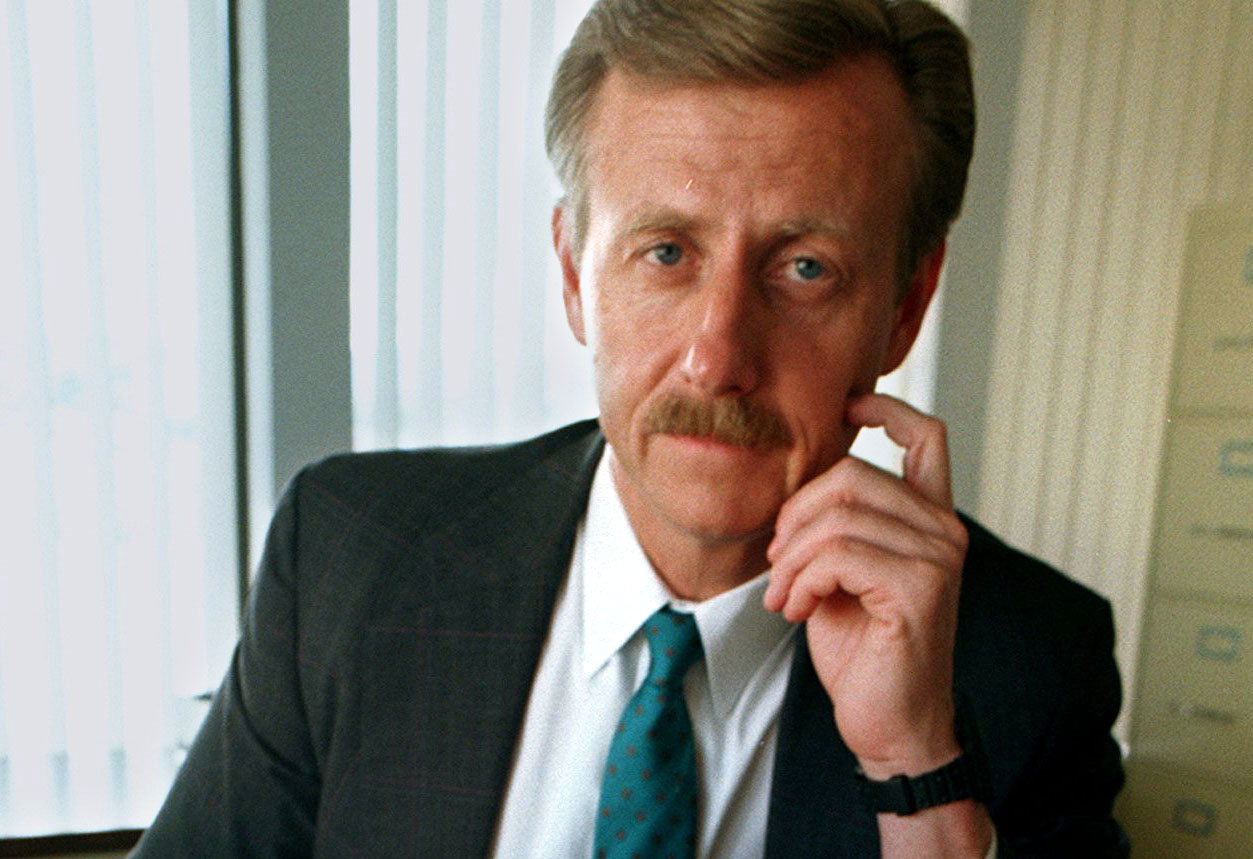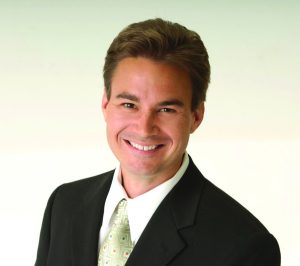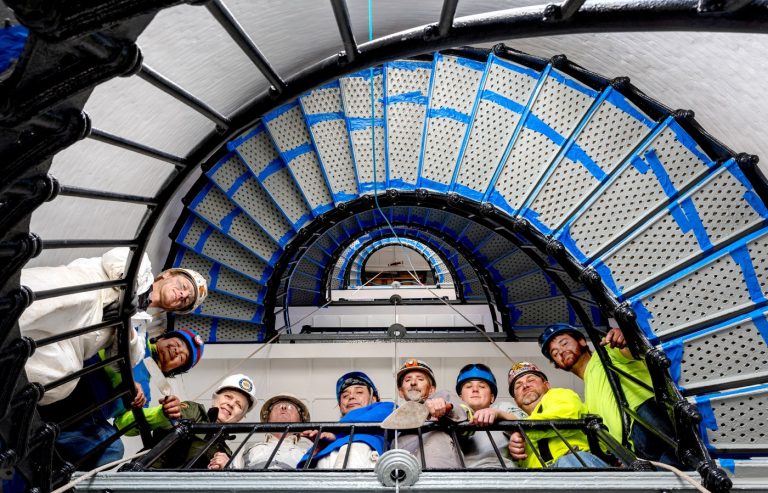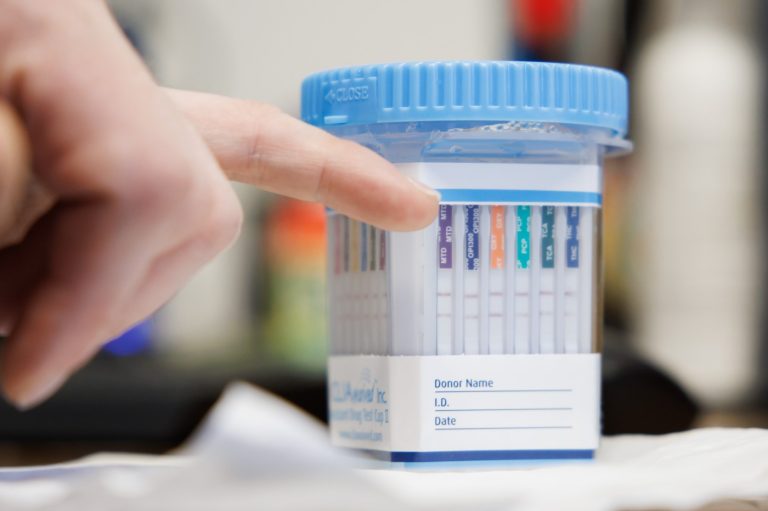These days, thieves hit Apple stores and scamper out with every iPhone they can grab. In Silicon Valley’s early years, criminals — sometimes with guns — went after the technology industry’s building block: the small but precious computer chip.
They robbed offices and freight trucks, or just snatched boxes of semiconductor chips from companies’ shipping docks. Shady brokers befriended tech workers at bars and bribed them to steal semiconductors and memory chips from their employers.
Rich Bernes, who oversaw the FBI’s high-tech crime squad, shows $150,000 in computer chips hidden in a pizza box to illustrate how easily they can be concealed and stolen on Wednesday, March 27, 1996. (Patrick Tehan/Bay Area News Group archive)
Many met their match in former San Jose FBI agent Richard Bernes, who launched the agency’s “high-tech crime squad” in the mid-1990s and died July 5 at age 78. Bernes used to demonstrate the value of computer components by stashing a few dozen semiconductor chips in a pizza box, then opening it to reveal half the price of a new house in a space the size of dinner.
The semiconductor — computer processors built on wafers of silicon made from sand — became the engine of an explosive transformation that gave the Valley of Heart’s Delight its new, technology-focused nickname. Silicon Valley was turning sand into gold. The rise of the computer chip birthed a feeding frenzy for criminals.
“I don’t know why anyone would rob a 7-Eleven store these days,” Bernes — nicknamed “Big Bird” by his fellow agents for his strapping stature — told businesspeople at a seminar in 1996. “You’ll only clear a few hundred dollars from a convenience store holdup. The average computer chip thief tends to clear six figures, maybe seven.”
Bernes arrived in San Jose in 1978. “We arrested a lot of fugitives together, worked a lot of bank robberies,” said Bernes’ former Bay Area FBI colleague and long-time friend Ernie Tibaldi.
But Bernes quickly grasped the burgeoning threat to Silicon Valley companies that were cementing the region’s place as the world’s leader in computer technology. He took it upon himself to go after the thieves who began preying on the tech industry.
“He was a one-man wrecking crew,” Tibaldi recalled. “The guy was just amazing.”
In 1979, eight years after Intel launched the first programmable semiconductor, thieves stole 10,000 tiny memory chips from the company’s Santa Clara warehouse. Two years later, in the same city, someone walked into an Advanced Micro Devices storage area and walked out with chips worth more than $200,000 in today’s dollars.
The ill-gotten fruits of Silicon Valley’s innovation were sold to companies in the United States and overseas — and also to America’s chief Cold War rival. In 1981, a federal prosecutor in a Wall Street Journal interview described “the Silicon Valley” as a hotbed for shipment of stolen computer chips and other technology to the Soviet Union.
Bernes grew up in Chicago and started his adult life as a pharmacist. One day a policeman overheard him arguing with his boss, and getting fired. The officer talked to Bernes, and went back into the shop and persuaded the boss to take Bernes back. The cop’s help planted a seed, and when Bernes learned the FBI was looking for agents with science backgrounds, he applied and got in. He was 23.
“He just enjoyed helping, always,” said Cindy Bernes, his wife of 53 years.
Cindy Bernes sits in the home office of her late husband and former FBI agent Richard Bernes, Friday, July 19, 2024, in San Jose, Calif. Richard Bernes launched the agency’s Silicon Valley high-tech crime squad and passed away July 5, 2024. (Karl Mondon/ Bay Area News Group)
After FBI postings in Connecticut and Pennsylvania, Bernes transferred to the Bay Area, first to San Francisco and then to San Jose — Cindy’s hometown — where they would live in the Almaden Valley for the next 50 years.
“Any big company in Silicon Valley in the ’80s, he either had a contact or he established one,” said Felipe Frocht, a former FBI colleague and close friend of Bernes. “He would not take no for an answer. He would continue insisting on meeting with those people.”
Former FBI agent Richard Bernes and his wife, Cindy (center) with Candi and Ernie Tibaldi (left), and Linda and Phil Frocht (right). Ernie Tibaldi and the Frochts were FBI colleagues of Bernes. (courtesy of Ernie Tibaldi)
Bernes launched an undercover unit to probe theft of chips and other technology and brought on Frocht. Frocht and the other operatives, working from an office for a fake distribution company near the San Jose airport, would pose as buyers or sellers.
By the mid-90s, tech thieves were committing dozens of armed robberies a year in Silicon Valley. In today’s dollars, companies were losing $2 million a week in chip thefts, with the devices often ending up in Vietnam, Taiwan, China, Eastern Europe and South America. Major computer hardware makers Sun Microsystems, Intel, Silicon Graphics and Acer America were hit, along with many smaller companies.
Related Articles
4-month-old puppy stolen at gunpoint reunited with San Jose owners
New details in murder case surrounding San Jose baby’s fentanyl death
Bay Area courts provide minimal services amid global tech outage
Suspect tries to steal sleeping bag from Saratoga preschool
Three arrested in connection with San Jose’s 15th homicide of the year
After San Jose memory chip maker Piiceon was robbed twice by armed men who held company vice-president Jeff Anhorn at gunpoint and pistol-whipped him, Anhorn and CEO Art Fonda in 1996 started wearing panic buttons on neck lanyards to instantly summon police in case they were targeted.
“We’re realizing that we’re in the diamond business,” Fonda told the Mercury News at the time. “The stuff we deal with is that precious.”
Local police agencies were investigating the tech thefts on a case-by-case basis, but Bernes began working with the departments to probe connections and identify the loose-knit criminal networks behind the crimes, his former FBI colleague and long-time friend George Grotz said.
That work culminated in Bernes launching “Operation West Chips,” a collaboration with San Jose Police, the Internal Revenue Service and the federal Bureau of Alcohol, Tobacco and Firearms targeting the costly and sometimes violent tech-crime wave described as a “campaign of terror” by a federal prosecutor.
Undercover operatives spent 18 months infiltrating criminal networks largely run by Vietnamese gangs. Vietnamese-speaking San Jose Police detectives played key roles, recalled Daniel Ortega, the department’s chief of detectives at the time.
After weeks of planning, more than 500 agents and police assembled at the San Jose Convention Center on February 28, 1996, then broke into 60 teams that fanned out across San Jose, Milpitas, Santa Clara, Sunnyvale, Sacramento and San Francisco. Forty-three suspects were arrested in often-dramatic raids.
Bernes was the operation’s “orchestra leader,” Grotz recalled.
“His leadership, his relationship with other agencies, particularly the San Jose Police Department, that really was the backbone of the success of that operation.”
The operation and Bernes’ work to push chip makers to heighten security put a major dent in the tech-theft epidemic, Grotz said.
Bernes retired from the FBI in 1997, and founded Bernes Group, a Los Gatos security-consulting business that often worked with tech firms.
Cindy and Bernes’ former colleagues recalled his love for skiing, swimming, mountain biking, barbecuing and wine collecting. He and Cindy held season tickets for the San Francisco 49ers and San Jose Sharks, and traveled together to 59 countries.
“We just enjoyed everywhere we went,” Cindy recalled. “We liked each other so much.”
A retirement display for former FBI agent Richard Bernes hangs on the wall of his home, Friday, July 19, 2024, in San Jose, Calif. Richard Bernes launched the agency’s Silicon Valley high-tech crime squad and passed away July 5, 2024. (Karl Mondon/ Bay Area News Group)












